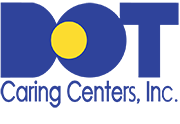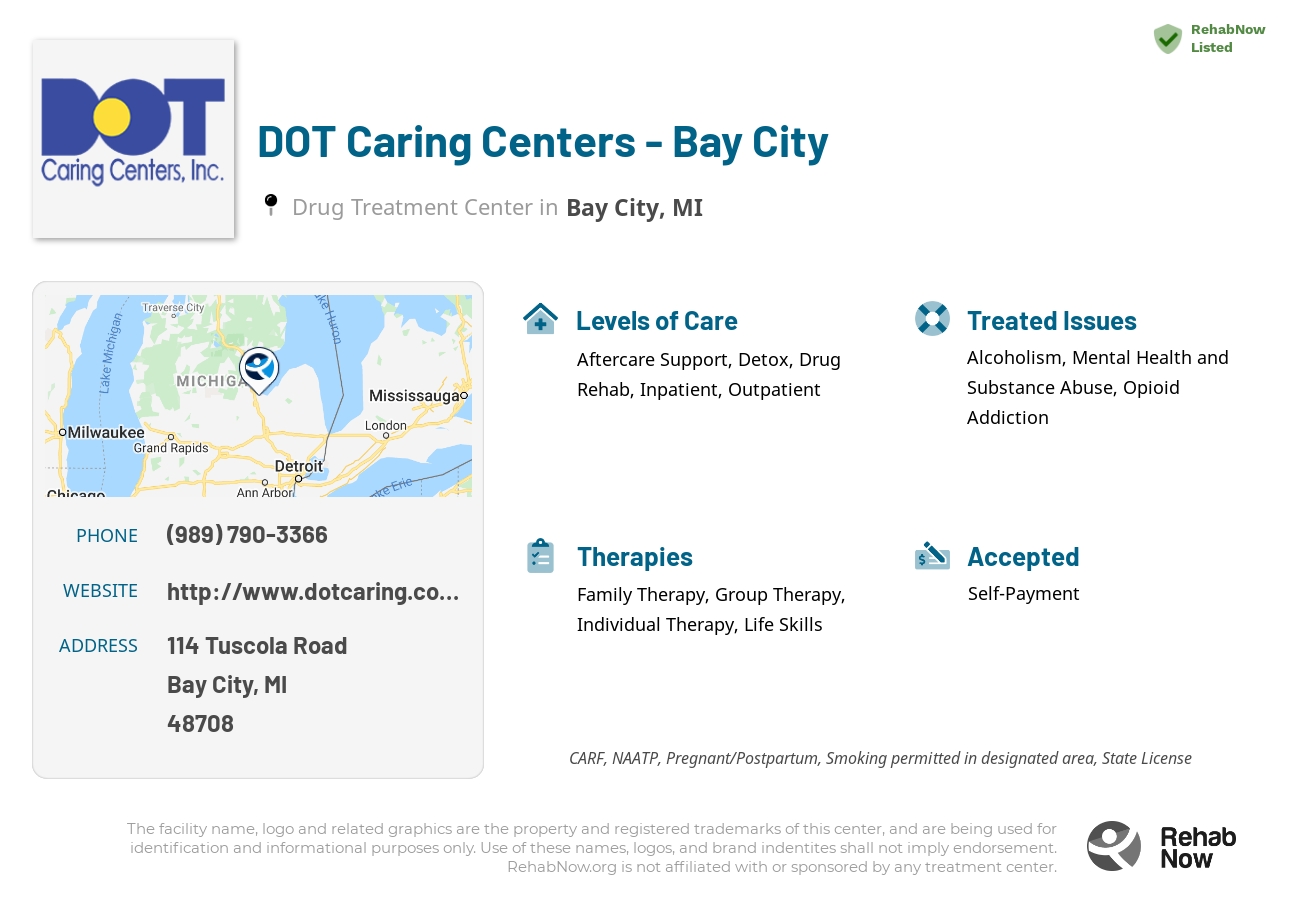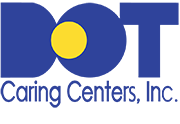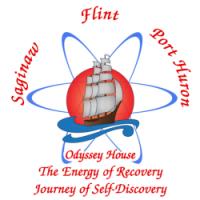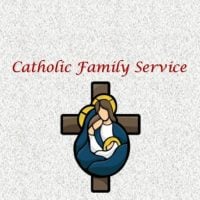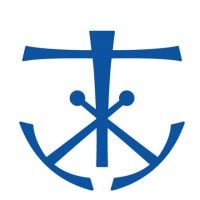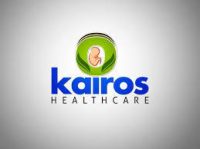DOT Caring Centers - Bay City
Drug Rehab Center in Bay City, Michigan
DOT Caring Centers - Bay City offers evidence-based treatment for substance and alcohol addiction, as well as co-occurring mental health disorders, in a safe and confidential environment, with a range of services including therapy, detox, medication-assisted treatment, and specialized programs for dual diagnosis, pregnant women, and adolescents.
About DOT Caring Centers - Bay City in Michigan
DOT Caring Centers – Bay City is a leading treatment facility located in Bay City, Michigan. The center offers evidence-based treatment for substance and alcohol addiction, as well as co-occurring mental health disorders. Their goal is to provide personalized care and support to each individual in an environment that is both safe and confidential. The staff at DOT Caring Centers – Bay City are experienced in providing assessments and tailored treatment services for individuals who are struggling with addiction.
DOT Caring Centers – Bay City offers a wide range of services to meet the needs of their clients. These services include individual and group therapy, medical detoxification and stabilization, medication-assisted treatment, relapse prevention, aftercare planning, and community support. The center also provides specialized treatment programs for dual diagnosis, pregnant women, and adolescents. They also have a strong focus on family therapy and emotional healing, as well as holistic treatments like yoga and meditation.
DOT Caring Centers – Bay City is accredited by the Commission on Accreditation of Rehabilitation Facilities (CARF), and is also certified by the state of Michigan. The facility has received recognition from the Substance Abuse and Mental Health Services Administration (SAMHSA), and is committed to providing best practices in addiction treatment for their clients. They also offer a variety of support resources and alumni programs to help clients on their journey to long-term recovery.
Genders
Ages
Modality
Additional
Conditions and Issues Treated
Opioid addiction has become a significant health problem in the United States. In 2015, there were 91 opioid overdose-related deaths per day, with a substantial increase in mortality rate in 2014.
When opioid addiction has reached a point where a person’s life becomes unmanageable, treatment options are available to help them get sober. Treatment that includes medical care with medications and counseling can help a user transition into sobriety.
Levels of Care Offered
This center offers a variety of custom treatment tailored to individual recovery. Currently available are Aftercare Support, Detox, Drug Rehab, Inpatient, Outpatient, with additional therapies available as listed below.
One of the first things an addict should do when entering treatment is to abstain from using illicit drugs completely. Depending on the length of time that the person has been using, the addict may have to go through alcohol or drug withdrawal. Fortunately, detox doesn’t have to be done alone, and withdrawal symptoms can be managed medically in an inpatient or outpatient setting. While detox may be uncomfortable, it is not life-threatening. Detoxification allows the addict to rid the body of all traces of drugs or alcohol and gives the addict a clean slate for their recovery.
Inpatient treatment for alcoholism or drug addiction is an option that provides the addict with a supportive environment in which they can stop using. After detox, an inpatient treatment center provides a structured environment for the addict to recover from their addiction and begin taking steps toward a lifetime of sobriety.
This type of treatment is appropriate for addicts that are most in need of intensive care and supervision. This includes those who were unable to quit on their own, those who need more structure than they can get in outpatient treatment, and those whose addiction has led them into legal trouble or severe health problems.
Outpatient treatment is often used for drug addicts in drug rehab. Outpatient treatment consists of counseling and therapy sessions. This form of treatment is also called ‘day-treatment’. The outpatient treatment process begins with the addict’s initial detox period, lasting about ten days.
Outpatient treatment is used for those who are at moderate risk for ‘slipping back’ into the addiction, for those who:
- Are not currently experiencing any side effects from withdrawal and can handle social pressure
- Can handle stressors that might trigger relapse
- Have a stable living environment or have moved out of their previous environment, which was not conducive to being sober
- Have a support system that allows them to go to a facility a few times a week while still keeping their current responsibilities
- Have no legal obligations, being either on parole or probation, that require them to seek treatment at a mandatory facility
- Are not currently experiencing any side effects from withdrawal and can handle social pressure
- Have a stable living environment or have moved out of their previous environment, which was not conducive to being sober
Completing a drug or alcohol rehab program is only the first step. Then comes aftercare support. These services include sober living accommodations, career counseling, and AA/NA programs for those struggling with sobriety or who want help maintaining it after initial rehab at an addiction facility.
They can last up to a year or more depending on what’s needed most urgently after the earlier stages are completed.
Therapies & Programs
Because no single treatment is effective for all addicts, the goal of treatment and therapy should be to figure out what works best for each individual. Tolerance and withdrawal levels differ from person to person, affecting the treatment intensity required. Addiction treatment should aim to help addicts develop healthy coping mechanisms for dealing with their addiction and its underlying causes.
Family therapy is beneficial for people who are in addiction treatment services because it offers addicts the opportunity to work with their family members to better understand what led them to make choices that contributed to their addiction.
This type of therapy helps family members reach a deeper understanding of how they can best support their loved one during recovery. It also helps the addict better understand their own motivations and triggers that led them to turn to substance abuse.
Family therapy can help addicts in the following ways:
- Assists family members in processing difficult feelings so they don’t blame or resent recovering addicts
- Assists family members in understanding how addiction has impacted the addict and everyone who is involved with them
- Allows the addict to take responsibility for their actions, while encouraging improved communication skills
- Helps family members understand how to best support an individual in recovery so addicts don’t relapse again.
Group therapy can help build a stronger support system and give addicts in Bay City, MI insight into their addiction that they gain through shared conversations. Group therapy occurs in a controlled group environment, exclusive of one on one meetings. This makes it safer for patients to feel comfortable sharing the struggles they’re going through and gaining perspective.
Life Skills Services assist addicts in their recovery by teaching them healthy coping mechanisms that will aid them in becoming sober, focussing on helping people enter into, and maintaining long-term sobriety. Drug Treatment Centers provide Life Skills Services at varying levels of intensity, specific to the needs and requirements of each patient.
The benefits of Life Skills Services offered at DOT Caring Centers - Bay City:
- Restores hope and empowerment — Helps addicts believe that recovery is possible and instills a new confidence in their ability to achieve a positive, drug-free future
- Enhances family involvement — Encourages families to get involved in the recovery process and supports their understanding and encouragement of healthy behavior.
- Increases patient’s compliance — Helps patients take responsibility for and ownership of their recovery and encourages continued progress
- Reduces relapse rates — Encourages long-term abstinence and emphasizes the importance of establishing sober support systems.
Payment Options Accepted
For specific insurance or payment methods please contact us.
DOT Caring Center Associated Centers
Discover treatment facilities under the same provider.
- DOT Caring Centers - Saginaw in Saginaw, MI
- DOT Caring Centers - Freeland in Freeland, MI
- DOT Caring Centers - Residential in Freeland, MI
- DOT Caring Centers - Owosso in Owosso, MI
- DOT Caring Center - Flint in Flint, MI
Learn More About DOT Caring Center Centers
Additional Details
Specifics, location, and helpful extra information.
Bay City, Michigan 48708 Phone Number(989) 790-3366 Meta DetailsUpdated November 25, 2023
Staff Verified
DOT Caring Centers - Bay City Patient Reviews
There are no reviews yet. Be the first one to write one.
Bay City, Michigan Addiction Information
Michigan has the second-highest rate of drug and alcohol abuse in the nation. Heroin is linked to more than 50% of the state's hepatitis C cases. Marijuana is the drug most often associated with crimes in Michigan, followed by methamphetamines. Opioids alone are responsible for almost 20% of all drug overdose deaths in Michigan.
The problem with drug addiction in Bay City, Michigan, is very bad. According to recent statistics, there are about 9,000 people who are addicted to drugs in this city. This accounts for about 7% of the population. This is a very high number for a city of this size. Even more alarming is that the number of people addicted to drugs in Bay City, Michigan, has increased.
Treatment in Nearby Cities
- Dearborn Heights, MI (91.1 mi.)
- Saint Ignace, MI (164.3 mi.)
- Fraser, MI (85.5 mi.)
- Harper Woods, MI (92.5 mi.)
- Lincoln, MI (79.4 mi.)
Centers near DOT Caring Centers - Bay City
The facility name, logo and brand are the property and registered trademarks of DOT Caring Centers - Bay City, and are being used for identification and informational purposes only. Use of these names, logos and brands shall not imply endorsement. RehabNow.org is not affiliated with or sponsored by DOT Caring Centers - Bay City.
